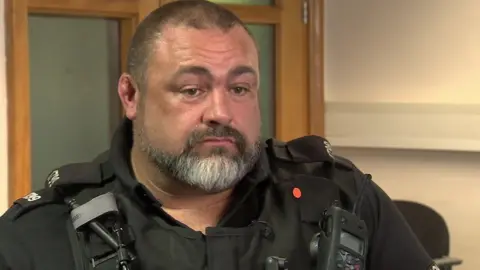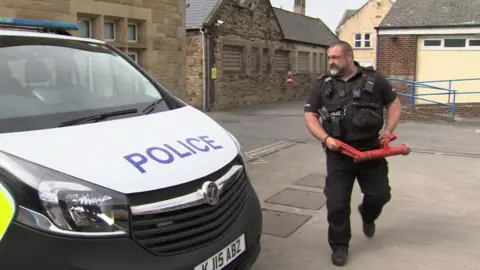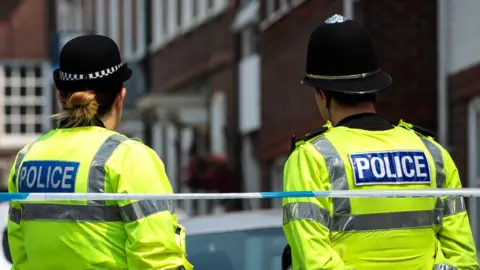PTSD 'at crisis levels' among police officers
 BBC
BBCPost-traumatic stress disorder (PTSD) among police officers in the UK is far more common than was ever thought, a new survey suggests. One PC describes his battle with the medical condition.
Lee Jackson is the kind of police officer who runs towards danger, the sort who is not afraid to break down doors or break up fights.
A Taser-trained response officer at Durham Police with over 19 years' service, he's dealt with almost every crime imaginable and was once three minutes from death after becoming impaled on a broken car aerial while investigating a car crash.
But PC Jackson was floored by a medical condition that affects thousands of officers without them even realising - PTSD, which causes acute anxiety, sleep problems and recurring memories of disturbing events.
"I thought I was pretty much invulnerable," says the 47-year-old constable. "I didn't see things building up or the problems that were going to affect us."

It all came to a head in 2015 when he was called to a violent domestic dispute.
"It was a Friday night on my own," he said. "I pulled up to stop some people arguing because it was starting to get a little bit more physical".
"I ended up being attacked - someone tried to gouge my eye out."
His eye became infected, leaving him temporarily blinded. He took a week off work but after returning began to have flashbacks at night.
"I would wake up sort of in a sweat and physically feel like I'd been back living that moment again," says PC Jackson.
His work suffered - he had doubts about whether he could do his job properly and felt everyone was out to get him - and he became a "nightmare" to live with at home.
Finally, he sought help and PTSD was diagnosed - it had been caused by the dozens of traumatic incidents he had handled and witnessed.
"What I'd done is just to put them away in a box in my brain, left them, and never had a chance to go back," he explains.
A major new survey suggests the health problems affecting PC Jackson are far more common in the police than was ever thought.
'Stiff upper lips don't work'
The study of almost 17,000 police across the UK found that 95% of officers and 67% of operational police staff had been exposed to traumatic events, almost all of which were work-related.
Of those who had experienced trauma, 20% reported symptoms in the preceding four weeks that were consistent with PTSD or the more chronic condition, Complex PTSD, which is associated with emotional numbness and disconnection.
Two-thirds of those with PTSD were unaware they were suffering from it, according to the research.
"For the first time in the UK we can see behind the cultural trope of the 'burnt-out copper' who has seen too much," says lead researcher Dr Jess Miller from the University of Cambridge, which conducted the study.
"This is a clinical and public sector crisis," she says, pointing out that the rates of PTSD in the police are almost five times higher than in the general population.
Among the most concerning findings, Dr Miller says, is that more than half of those surveyed said they had insufficient time to process incidents before being sent back out on the next call.
"A stiff upper lip attitude will not work in contemporary policing," she says.
 Getty Images
Getty ImagesOne officer told the survey he had developed night terrors after attending a series of murder scenes; another said he had a nervous breakdown and suicidal thoughts after reliving a death in custody during the formal inquiry; some spoke about the stress of spending months viewing "horrific" terrorism material or paedophile chatlogs online.
Gill Scott-Moore, chief executive of Police Care UK, the charity which funded the research, says: "The service has real challenges around recognising and responding to the signs and symptoms of trauma exposure and is heavily reliant upon generic NHS provision that isn't equipped for the specialist treatment needed."
In April, a national police wellbeing service was launched to provide expertise on occupational health provision to forces across England and Wales.
The service, developed with £7.5m investment from the Home Office, has been overseen by the College of Policing alongside Lancashire Chief Constable Andy Rhodes, who leads on the issue nationally.
"The study does not surprise me and it provides evidence to support investment in prevention as well as acute services,'' says Chief Constable Rhodes.
"With stigma around mental health slowly reducing we are seeing hidden issues emerging such as high levels of stress and trauma impact, which can contribute to escalation if they aren't addressed," he adds.
 Getty Images
Getty ImagesPC Lee Jackson managed to address his problems - after six months of one-to-one counselling.
But he says much more needs to be done to give officers and staff information about how to spot the signs of PTSD and where to go for support.
He says: "We've got a tactic for everything in the police [but] we haven't for when you are dealing with traumatic incidents or trauma in yourself and we maybe need that."
Che Donald, national vice-chairman of the Police Federation of England and Wales, called for more government funding to help officers who "are at breaking point".
"If officers are breaking, then how can we expect them to adequately serve and protect the public?" he added.
